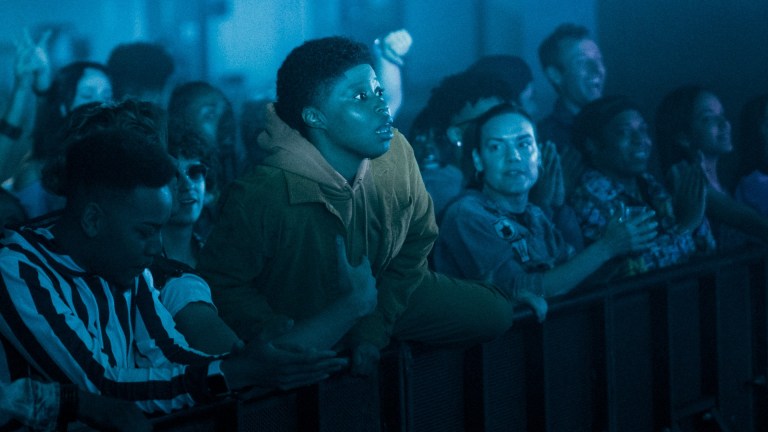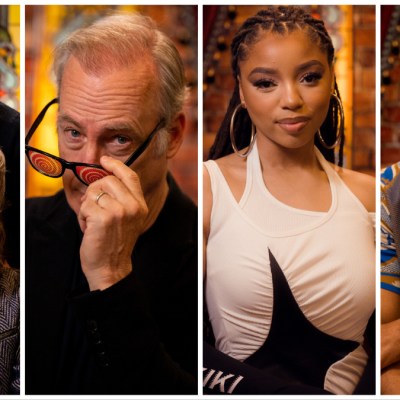Swarm Ending Explained: What Happens With Dre and Ni’Jah?
The Swarm finale pushes the limits of its "this is not a work of fiction" premise. Allow us to explain the Prime Video series' ending.

This article contains spoilers for Swarm.
There’s an old African proverb that says “the child who is not embraced by the village will burn it down to feel its warmth.” Prime Video’s surreal horror series, Swarm, takes that proverb and tweaks it to a modern context. Throughout Donald Glover and Janine Nabers’ ode to dark obsession, Andrea “Dre” Greene (Dominique Fishback) burns down not one village but several – from Houston to Nashville to Little Rock to Atlanta – all to feel the radiating maternal warmth from one person: international pop superstar Ni’Jah.
https://www.denofgeek.com/tv/swarm-cast-inside-billie-eilishs-first-tv-role/Swarm is a difficult story to fully wrap one’s hands around. Six of the series’ seven episodes promise that the outlandish events viewers are witnessing are all true. And they are, to a certain extent, with Glover, Nabers, and the show’s writing staff drawing upon urban legends surrounding Beyoncé, standom culture, and just the weirdness of the internet at large. Then one of those six episodes, the penultimate one, takes things one step further by presenting the “real” true story beneath the already supposedly real (but in reality fabricated) story of Dre’s rampage.
Add in the strangely ethereal tone that Glover and Nabers developed on Atlanta, and Swarm can be a confusing experience. But never fear! We’re here to break down the final two episodes of Swarm, reveal what was “real,” and ponder what’s next for Ni’Jah and Dre.
Swarm Episode 6 Explained
Swarm is the rare episodic experience that reveals its true chronological ending before the show itself actually ends. That end comes in the series’ sixth and second-to-last installment “Fallin’ Through the Cracks.” Like several Atlanta episodes before it (see: “B.A.N.” and “The Goof Who Sat By the Door”), “Fallin’ Through the Cracks” is a meta show within a show. In this case, the show is Falling Through the Cracks (note the added “g” rather than the apostrophe, adding to the unreality of the experience) – a true crime documentary featuring Memphis PD detective Loretta Greene (Heather Simms).
“Fallin’ Through the Cracks”/Falling Through the Cracks follows Loretta as she uncovers the reality of a serial killer working her way throughout the south. Loretta is able to use her status as the rare Black woman detective in the police department and her in-depth knowledge of social media to work out what absolutely no one else can. This string of crimes – from the murder Khalid Woods in Houston (which we see in episode 1) to the bludgeoning of a genial mechanic in Tennessee (which we see in episode 2) – are all connected and all involve a Ni’Jah (though the name is always bleeped out) stan.
Loretta even uncovers a likely-related case that viewers never get to see in any of Swarm‘s seven episodes: the bloody killing of Tiffany Long in Nashville. In fact, Tiffany’s murder represents the beginning of Loretta’s larger investigation as she notices that Tiffany was critical of Ni’Jah online and also notes the presence of Hot Cheetos in the home (“I never met a white woman who ate hot Cheetos.”).
Ultimately, this episode serves as not only a helpful rundown of Dre’s cascading crimes but also an explanation for them. Loretta’s search for the killer brings her to Marissa Jackson’s (Chloe Bailey) family in Houston. Though we just saw Marissa’s father, Harris, alive and well when Dre paid them an ominous visit in episode 5, now he has been dead since May, leaving Marissa’s mother Patricia as a widow.
In Houston, Loretta discovers that Andrea “Dre” Greene was adopted by the Jacksons as a child, making her Marissa’s step-sister. Much like she would one day come to be with Ni’Jah, Dre was completely obsessed with her stepsister. Also like with Ni’Jah, Dre’s obsession with Marissa would eventually turn violent. When a girl named Gwen Guillroy attempts to play a prank on Marissa during a sleepover, Dre reacts with animalistic fury, attacking and ultimately stabbing Gwen. This is the “spilling milk” moment that Dre reveals under hypnosis to Eva (Billie Eilish) in episode 4.
If all episode 6 did was reveal the origins of Dre’s penchant for violent obsession, it would be a landmark installment of the series. But episode 6 does more than that even. Like a nesting doll of meta realities, episode 6 seeks to present the really real story behind everything Swarm has depicted thus far. This means that none of the actors who have previously depicted the show’s characters appear here. Dre is not played by Dominique Fishback but rather London Rose. Additionally, the final moments of the episode feature a red carpet interview from Donald Glover himself in which he mentions his excitement for directing an upcoming Amazon series starring Dominique Fishback, Chloe Bailey, and Damson Idris i.e. this very show that we are now watching.
The implication here is that “Fallin’ Through the Cracks” isn’t the “meta” episode of Swarm. It’s the only “real” episode and everything else viewers have seen thus far is the artistic (and yes, meta) interpretation of it. Then, if that weren’t enough, “Fallin’ Through the Cracks” goes ahead and reveals the ultimate end of the series for good measure.
Before that unmooring Donald Glover moment, Loretta receives a call from her sources in Atlanta that says a woman matching Andrea Greene’s description has been arrested at a Ni’Jah concert, though she’s now living as a man named Tony. That right there represents the chronological end of the show: Dre stormed the stage at the Ni’Jah concert and was arrested. The Houston, Nashville, and Little Rock police departments are reopening the previous murder cases that we’ve seen thus far and Dre will likely be discovered to be a Ni’Jah-obsessed serial killer.
That’s all pretty conclusive. So why does Swarm even bother adding another episode after it? For the art, my friends, for the art.
Swarm Episode 7 Explained
As the ending of episode 6 suggests, Dre has been living as a man named Tony in Atlanta for some time now. Without access to her phone or Marissa’s phone, Dre appears to have calmed down a bit. We even get an idea of what her “happily ever after” might look like if she were able to break away from her murderous impulses.
As Tony*, Dre meets a lovely young woman named Rashida. After an awkward courtship involving car trouble and expensive flowers, Tony and Rashida fall in love. The pair are together for over a year with Tony even getting to meet Rashida’s family, who all immediately accept her for who she is. Unfortunately, however, Dre is never able to divorce herself from her Ni’Jah obsession.
*Interestingly, Nabers cites prestige TV antiheroes like Tony Soprano as an influence on the character of Dre.
When Dre surprises Rashida with expensive Ni’Jah tickets on their anniversary, Rashida understandably freaks out. Rashida has not only made it clear that she doesn’t like Ni’Jah but spending this amount on tickets is a real slap in the face when the couple is in dire financial straits already and relying on Rashida’s parents for frequent cash infusions. Dre responds this Ni’Jah heresy the way she usually does and chokes Rashida to death.
Dre’s up close and intimate murder of someone she supposedly loves is by far the most upsetting bit of violence that Swarm presents through all of its seven episodes. Given the fact that episode 6 already revealed the conclusive ending for Dre’s character, one might wonder why this last murder was necessary to include at all.
When speaking with Den of Geek at SXSW, Nabers said that the chief goal of Swarm, above all else, was to focus “on a feeling – the feeling that this pop star gives.” In some ways, episode 6’s ending frees Swarm up to focus solely on depicting that feeling above all else – because all illusions of reality have fallen.
Episode 7, provocatively titled “Only God Makes Happy Endings” is the first episode of Swarm to completely own up to being artificial. Even though the usual “This is not a work of fiction” claimer runs at the top of the episode, we already know that this “Dre” is not the real Dre but rather the actress Dominique Fishback’s interpretation of her.
The final moments of the episode dial up the surreal artificiality to 11. Even if we hadn’t seen episode 6, which made clear that Dre was captured and arrested, we would still know that there’s something off with the final scene. Dre somehow makes it onstage with Ni’Jah, who now has Marissa’s face unsettlingly CGI’ed onto the pop star’s body. Ni’Jah not only clocks the Tony-mode Dre as a woman but also invites her to stay on stage and share her song with the world.
Dre, perhaps feeling the warmth of the proverbial village for the first and final time, says “I love you all.” She is then welcomed into the backseat of Ni’Jah’s van, where she looks up at her idol (still wearing Marissa’s face) with all the reverence of the Earth gazing upon the Sun.
Obviously, none of this is real. Swarm never makes any attempt to hide that it isn’t. From the ending already being revealed in episode 6 to the uncanny valley depiction of Marissa’s deepfaked face on Ni’Jah, this ending is all about one thing and one thing only: artifice. These final moments are so transparently unreal that they retroactively infect every other supposedly “real” moment that came before it. Was Dre’s time spent with Rashida real? Was Falling Through the Cracks real? Were any of these murders real? Are you real? Am I even real? Is any of this shit real?
In the end, Swarm‘s pre-episode opening scrawl promising the truth isn’t just a cheeky Fargo-ian joke but a creative masterstroke. By priming its viewers for something real and then presenting something surreal, Swarm doesn’t just interrogate the dark implications of a culture obsessed with celebrity standom, it also interrogates how celebrity standom influences reality itself.
Will There Be a Swarm Season 2?
Though much of the Swarm finale is left up for interpretation, one aspect definitively is not: this story is over. If season 1 receiving essentially two finales wasn’t a big enough indication that there would be no Swarm season 2, showrunner Janine Nabers just went ahead and confirmed it.
“This is a limited series. This is a story that has a very clear beginning, middle and end, so this is it,” Nabers told the Los Angeles Times.
Swarm‘s enigmatic, provocative ending only becomes that much better when it becomes clear that there is no relief of a second season on the horizon. Dre did what she did. Or she didn’t. Contemplating that uncomfortable ambiguity is up to us now.
All seven episodes of Swarm are available to stream on Prime Video now.

